- FLAMED
- See inflamed.
- FLAMME DE BOEUF
- See bullock pennant.
- FLAMME DE FOURRAGΙRE
- See lanyard pennant.
- FLAMME DE GUERRE
- See masthead pennant 1).
- FLAMMULA
- 1) A late Roman military flag of elongated shape designed to fly horizontally
and split along its entire length.
- 2) A pre-heraldic flag cut into the form of a flame (see also
flammule and
pre-heraldic).
Please note, at least one source suggests that flammula 1)
might have been two red streamers attached to a lance (see also
streamer.1)).
- FLAMMULE
- A flame shaped flag edge now characteristic of the Far East, but see also
'flamumlets' below,
flammula 2)) above, and flammully.
![[Chinese Imperial standard, 1870]](../images/v/vxt-d156.gif)
Imperial Standard, China c1870 (Eugene Ipavec)
- FLAMMULETS
- 1) Specifically in largely Central-European usage, the term for a series of flame-like
(that is wavy-edged) triangular charges, that facing both inward and outward, create a repeating
pattern of colours and form the border of a flag - usually around four edges, but occasionally
along the outer sides or a single edge only (see also border,
flammule above, flammully and
wolfteeth).
- 2) Generically as above, but the term may be extended to include a border consisting of triangular
charges (either upright or slanted) whose sides are straight but see note below.
![[flammulets example]](../images/v/vxt-d669.gif)
![[flammulets example]](../images/v/vxt-d669a.gif)
Imperial Standard 1828 1894 and another Imperial Flag, Austria-Hungary (Željko Heimer)
Please note with regard to 2) that the term flammulets should
only apply to a border where the triangular charges face both inward and outward, and that
where those charges face only inward the correct term is wolfteeth.
- FLAMMULLY (or FLAMULLY)
- A term that may be used when there are a number of flame-like projections from a charge or ordinary,
or to describe a border made up of flammulets (see also
border,
charge 1),
flammule,
flammulets and
ordinary).
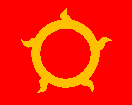

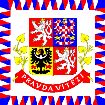
From left: Examples (2); Presidential Standard of The Czech Republic (fotw)
- FLAPPING FLAG
- An exact translation of the German terms knatterflagge or knatterfahne see
vertically hoisted flag.
- FLASH COLLAR
- A decorative cover sometimes used at the base of an outdoor flagpole.
- FLEUR-DE-LIS
- A charge reputedly in the form of a stylized lily, particularly associated
with the former Royal House of France but widely used elsewhere - a heraldic
lily (see also
fleury below and
cross fleury in appendix VIIIand
double-tressure).
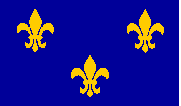
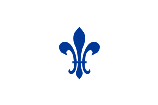
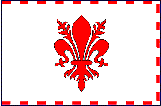
The Royal Banner of France (fotw); Flag of Aarchot, Belgium; Flag of Florence,
Italy (fotw)
- FLEUR-DE-LIS CROSS
- See cross fleury in appendix VIII.
- FLEURY (or FLORY, FLORETTY or FLORONNY)
- The heraldic term used when a charge (or charges) or an ordinary, such as a cross, baton or
bar, is (or are) decorated with fleur-de-lis flory, floretty or floronny (see also
fleur-de-lis above,
ordinary,
tressure and
cross fleury in appendix VIII).
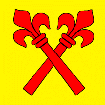
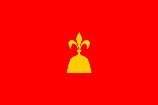
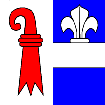
Flag of Brisbach, Switzerland (fotw); Flag of Puigcerdΰ, Spain (fotw); Flag of Grellingen, Switzerland (fotw)
Please note that this term is never used alone, but always with the charge so
described - for example batons-fleury as illustrated above.
- FLOTILLA COMMAND PENNANT
- See command pennant.
- FLY
- 1) That edge or section of a flag, which lies opposite to (or furthest from)
the flagpole, mast or staff (see also Appendix I
and hoist).
- 2) (v) The act of displaying a flag from a flagpole, flag mast or flag staff
(see also 'wear a flag').
- 3) The length of a flag (see also length).
- FLY-DIAGONAL
- 1) A direct translation of the Dutch term vluchtdiagonaal but see
per bend sinister and
ascending diagonal 2).
- 2) See inclined fly.
- FLY-TRIANGLE
- See triangle.
- FLYING ANGEL FLAG
- A term for the flag of The Missions to Seafarers (formerly The Missions to Seamen),
a worldwide missionary and welfare arm of the Anglican Church founded in 1856 (see also
bethel flag and
church pennant).
![[Seafarers mission]](../images/v/vxt-d561.gif)
![[Seafarers mission]](../images/v/vxt-d561a.gif)
From left: A Former Design c1950; Flag of The Missions to Seafarers From 2000, UK (fotw)
- FLYING AT THE PEAK (or AT THE PEAK OF THE GAFF)
- See peak 1) and its following notes (also
gaff and
shift colours).
- FLYING LINE
- A short, weighted length of line that is suspended below a helicopter, other slow
moving aircraft or from the forward stumpmast yardarm of a cargo transit vessel on inland
waterways, used to fly a banner, flag or house flag and with the weight adjusted to the
speed of the craft involved in order to keep it vertical but see flying rod below
(also banner 5), 'house flag 1)',
stumpmast and yardarm).
Please note that this term (and flying rod below) has been introduced by
the Editors as no existing established term could be found.
- FLYING ROD
- A short, removable rod that is vertically mounted above and/or below the yardarm of a
stumpmast and which is used for the flying of a house flag or pennant, usually aboard cargo transit
craft on inland waterways - but see flying line above (also
house flag 1),
stumpmast and pennant 2) ).
Please note that this term (and flying line above) has been introduced by the
Editors as no existing established term could be found.
- FNFL JACK
- See jack of honour.
- FOLK FLAG
- A homemade national flag of simplified design.
- FOOTBALL FLAG
- See sports flag.
- FORCENΙ
- See appendix V.
- FORE, AT THE
- (adv) When a flag is flown at the truck on the foremast of a ship it is described
as being at the fore, and a command flag of a vice-admiral was formerly flown
in this position (see also flag of command,
flagship, foremast,
mast,
masthead and
truck).
- FOREMAST (or FORE)
- The forward vertical mast in a three or four masted sailing ship or the forward
mast of a motor vessel regardless of the number of masts (see also
main, mast
and mizzen.
- FORK(ED)-TAIL (or FORK-TAILED)
- See swallow-tailed(ed).
- FORKED ENSIGN
- See swallowtail(ed).
- FORTRESS FLAG
- The term for a flag, now obsolete, that was flown over military defences (either inland or coastal).
In British and Russian usage this was the naval jack, whilst in others the war flag/naval ensign or the
state/national flag (or a variant thereof) might be employed.
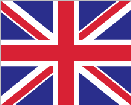
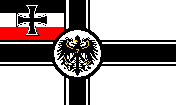
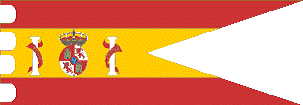
1801 Pattern of Union Jack, UK (Graham Bartram); War Flag/Naval Ensign, Germany 1903 - 1919 (fotw);
Flag of Coastal Fortresses and Naval Buildings, Spain 1785 (fotw)
- FOULED (or FOUL) ANCHOR
- In United Kingdom usage and some others, the term for an anchor entangled with its cable - but see
cabled.
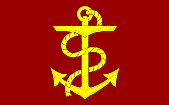
Flag of the Navy Board, UK (fotw)
- FOUR FREEDOMS FLAG
- See honour flag 1).
- FRACTED
- A heraldic term used when an ordinary, such as a bar, fess or chevron, is broken in one or more places
(see also ordinary).
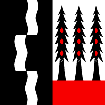

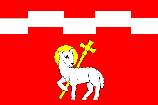
Flag of Braunwald, Switzerland (fotw); Flag of Leuggelbach, Switzerland (fotw);
Flag of Markvartice, Czech Republic (fotw
- FRAME
- 1) The wood or metal bar by which the top edge of a flag is held but see
framed flag 1) below (also
cross bar).
- 2) In largely (but increasingly obsolete) maritime usage, this term may also describe the rod (attached to a
ships mast or yard by lines) that is inserted into the heading of a streamer or pennant in order to stiffen it
at the hoist but see headstick (also
command pennant with following notes,
distinguishing vane,
pennant 2),
streamer 2) and
vane 1)).

- FRAMED FLAG
- 1) A flag that is designed to be attached both along its hoist to the staff, and along
its top to a side-mounted cross-bar sometimes called a gonfalon (see also
cross bar), frame above
and staff 2).
- 2) See outrigger flag.
![[framed flags]](../images/v/vxt-d148.gif)
From left:
Flag of Hirnyk, Ukraine; Flag of Huta, Ukraine (Dov Gutterman)
- FRANKLIN FLAG
- An early (unofficial but used and quite widely reproduced) pattern of the stars and
stripes; it was first detailed by Benjamin Franklin whilst ambassador to Paris, flown in
European waters by John Paul Jones and aboard the captured HMS Serapis, and was one of
the first versions to gain international recognition the Serapis flag (see also
Betsy Ross flag,
continental colours,
old glory,
star-spangled banner and
stars and stripes).

The Franklin Pattern of Stars and Stripes, 1778 (fotw)
- FRETTY (FRETE or FRETTΙ)
- The heraldic term for a pattern of interlaced bars forming a (usually) diagonal trellis either overlapped or joined together
(see also interlaced).
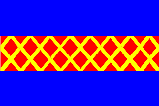
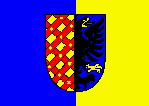

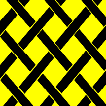
Flag of Kojetνn, Czech Republic (fotw); Flag and Arms of Prostμjov, Czech Republic (fotw); Flag of Oulens-sous-Echallens, Switzerland (fotw)
- FRINGE
- A decoration of twisted thread and/or metal attached to edges of a flag intended
for ceremonial and/or indoor use (see also colour 2),
cravat,
indoor flag
and parade flag).
- FRUCTED (or FRUITED)
- The heraldic term for when a tree or branch is bearing fruit, generally shown in another
tincture (see also tincture)
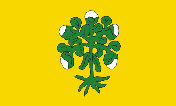
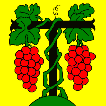

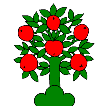
Flag of Bormla, Malta (fotw); Flag of La Praz, Switzerland (fotw); Arms of Runovinci,
Croatia (fotw); Flag of Pomy, Switzerland (fotw)
- FULL ACHIEVEMENT OF ARMS
- See 'achievement of arms' and
'armorial bearings.
- FULL DRESSING
- 1) See dress ship, to 1)
and dress ship, to 4).
- 2) See dressing overall 2)
and dressing overall 3).
.
- FULL MAST (or FULL STAFF) A FLAG
- (v & adj) To fly a flag in its normal position right up to the truck, a term
generally used after a flag has spent a mourning period at half mast (see also
flag pole, half mast
and truck).
- FULL MOON
- See moon 2) with following note and per complement 2).
- FUNERAL ACHIEVEMENT
- See achievement of arms 2).
- FUNERAL FLAGS (or PENNANTS)
- 1) Flags or pennants flown from the cars in a funeral cortege or procession, in order to
facilitate keeping that cortege together and to help other drivers avoid breaking
into it, not to be confused with a pall flag or with mourning flags (see also
car flag,
mourning flag and
pall flag, together with
badge banner,
bannerole,
great banner,
grumphion and
livery banner).
- 2) The term may also be used to describe those flags often draped with a mourning ribbon that are carried
in a funeral cortege (see also draping,
cravat 2) and
mourning ribbon).
- FURL(ED)
- 1) (v) To wind (roll up) a colour or national flag around its staff before
it is cased usually done with ceremony (see also
unfurl,
case,
uncase,
colour (2) and
parade flag).
- 2) (adj) A flag is considered furled when hoisted in a rolled and/or folded
condition prior to being broken out at the truck see
break a flag (also
truck).
- FURS
- See Appendix III.
- FUSELAGE MARKING
- See fin flash and
roundel 1).
(also aircraft marking(s)).
- FUSIL
- The heraldic term for an elongated lozenge - see lozenge.
- FUSILLY
- See lozengy.
- FUSILLY BENDY (or BENDY SINISTER)
- See lozengy bendy.
- FYLFOT
- See swastika.
![[flammulets example]](../images/v/vxt-d669.gif)
![[flammulets example]](../images/v/vxt-d669a.gif)









![[Seafarers mission]](../images/v/vxt-d561.gif)
![[Seafarers mission]](../images/v/vxt-d561a.gif)






![[framed flags]](../images/v/vxt-d148.gif)









![[Chinese Imperial standard, 1870]](../images/v/vxt-d156.gif)


